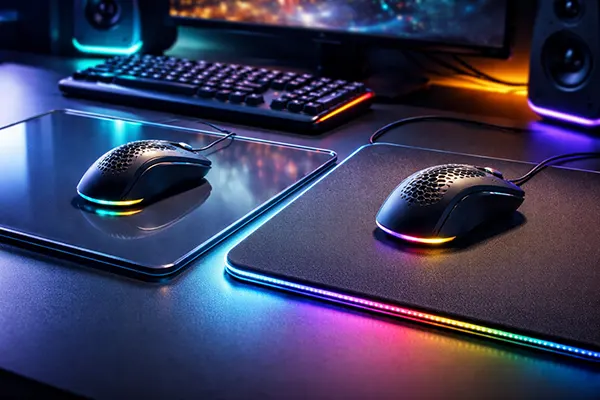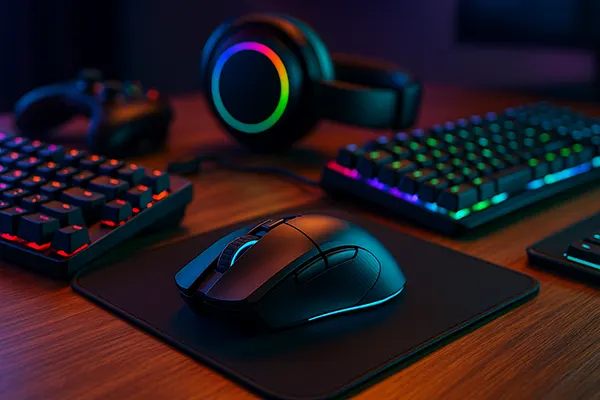
Guide to Selecting the Perfect Gaming Keyboard
The thrill of gaming isn’t solely reserved for breathtaking graphics or immersive storylines. A significant part of the experience lies in your fingertips, controlled by a device often overlooked: the gaming keyboard. Choosing the perfect gaming keyboard can be as crucial as selecting your gaming rig. This article will guide you through the different types of keyboards and help you understand what might suit your gaming needs best.
Broadly, keyboards fall into three categories: membrane, mechanical, and scissor. The choice among them primarily hinges on personal preference, budget, and gaming style.
Membrane keyboards operate on a simple principle. When a key is pressed, it pushes down on a rubber dome underneath, completing a circuit on the membrane layer and registering a keystroke. These keyboards are often inexpensive, lightweight, and quiet. For casual gamers or those on a budget, a membrane keyboard could serve well. However, they may not provide the tactile feedback and speed that competitive gaming often demands.
Next, we have the mechanical keyboard, the perennial favorite among avid gamers. Each key on a mechanical keyboard houses a complete switch underneath, including a base, a spring, and a stem. This setup allows for faster and more accurate keystrokes, giving a significant performance edge in gaming. Mechanical keyboards also offer tactile and auditory feedback, a feature much appreciated by touch typists and gamers alike. Moreover, these keyboards come in a variety of switch types, such as linear, tactile, and clicky, catering to different preferences. Though mechanical keyboards are typically more expensive than their counterparts, their durability and performance benefits make them a popular choice.
Scissor keyboards represent a middle ground between membrane and mechanical types. Their mechanism involves a pair of plastic pieces that interlock in a “scissor” mechanism, providing a smoother and quieter keystroke than mechanical keyboards. These keyboards are commonly found on laptops due to their slim profile. While they don’t provide as much tactile feedback as mechanical keyboards, they offer a superior feel compared to membrane keyboards. If you’re a gamer who values silence and prefers a low-profile keyboard, a scissor keyboard might be your ideal choice.

Criteria for choosing a gaming keyboard
A well-chosen gaming keyboard can vastly enhance gaming prowess, while a poor match could mean a string of frustrating defeats.
- Key Switches: The feel of a keyboard is determined by its switches. Membrane switches provide a softer touch but lack tactile feedback, while mechanical switches offer more precision and a satisfying ‘click.’ For swift, accurate responses, most gamers prefer mechanical keyboards. However, membrane keyboards may suffice for casual gaming or budget constraints.
- Keyboard Size: Size impacts both comfort and functionality. Full-size keyboards include a number pad, but Tenkeyless (TKL) models omit this feature for a more compact design. Consider the games you play and whether a numpad is essential. For gamers with limited desk space or those who prefer a minimalist setup, a TKL or compact keyboard could be the perfect fit.
- Backlighting: Backlit keys not only add a cool aesthetic but also aid visibility in low-light settings. Basic keyboards may have single-color backlighting, while high-end models often feature per-key RGB lighting. If you often game in the dark or appreciate a vibrant display, opt for a keyboard with adjustable backlighting.
- Macro Keys: Macros are a sequence of keystrokes assigned to a single key, allowing complex actions to be executed swiftly. For complex MMORPGs or strategy games, macro keys can be a game-changer. Look for keyboards that offer programmable keys and easy-to-use software for creating macros.
- Build Quality: A gaming keyboard should withstand heavy use. Quality construction, durable keycaps, and sturdy switches are markers of a keyboard built to last. Look for keyboards with metal backplates or double-shot molded keycaps for longevity.
- Key Rollover & Anti-Ghosting: Key rollover refers to a keyboard’s ability to register multiple keystrokes simultaneously. ‘n-key rollover’ keyboards can recognize an unlimited number of keys pressed at once. Anti-ghosting ensures that every keypress is registered accurately, even during frantic button-mashing sessions. These features are critical for fast-paced games where simultaneous key presses are common.
- Connectivity: Wired keyboards guarantee a stable connection, vital in online gaming where lag can be disastrous. However, advances in technology have produced wireless keyboards with minimal latency. If cable management is a concern, a wireless keyboard might be worth considering.
- Ergonomics: Long gaming sessions can strain your wrists. An ergonomic design, adjustable feet, or a detachable wrist rest can make extended play more comfortable.
In conclusion, choosing a gaming keyboard is an art and science. By considering the criteria above and understanding how they match your personal gaming style and requirements, you can select a keyboard that takes your gaming experience from enjoyable to extraordinary. So make your choice, and let your fingers do the talking.




